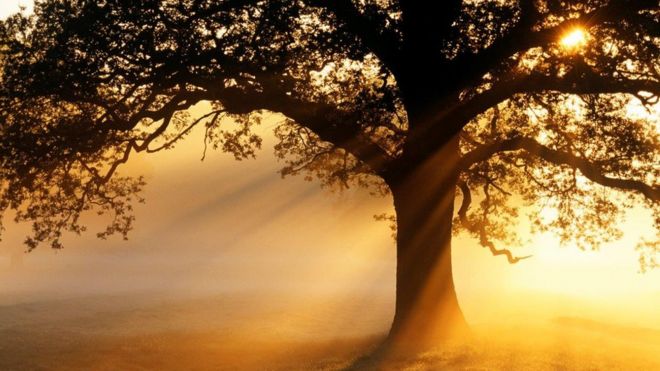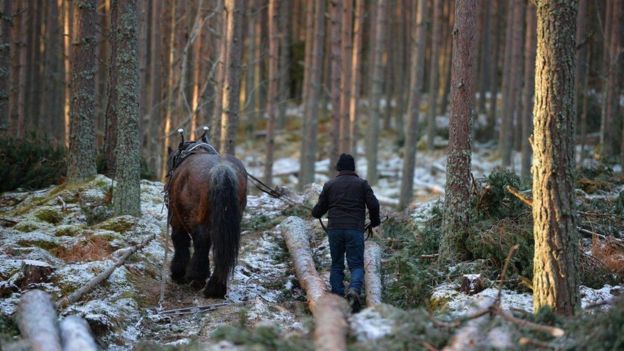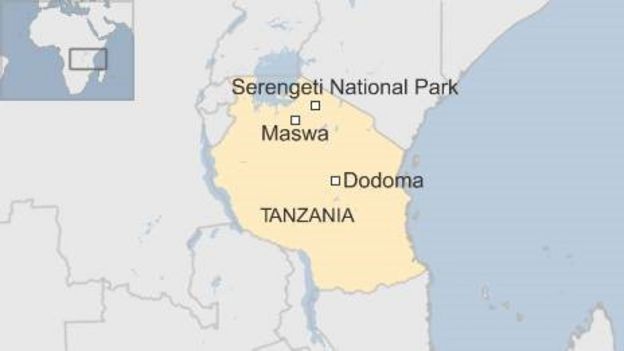The assumption that planting new forests helps limit climate change has been challenged by a new study.

The replacement of broad leaf species like oak with conifers has increased warming say researchers
Researchers found that in Europe, trees grown since 1750 have actually increased global warming.
The scientists believe that replacing broadleaved species with conifers is a key reason for the negative climate impact.
Conifers like pines and spruce are generally darker and absorb more heat than species such as oak and birch.
The authors believe the work has implications for current efforts to limit rising temperatures through mass tree planting.
Management issues
Europe's green canopy was dramatically thinned between 1750 and 1850, when the forested area diminished by 190,000 sq km.
Ironically the greater use of fossil fuels, particularly coal, slowed the timber rush, and from 1850 to the present day, Europe's forests grew by some 386,000 sq km and now cover 10% more land than before the industrial revolution.
However, the form and content of these new woods differed considerably from what went before.
In the distant past, these forests ran wild - but in the modern world, some 85% of Europe's trees are managed by humans. And over the past 150 years, foresters have adopted a scientific approach to woodlands - planting faster growing, more commercially valuable trees such as a Scots pine and Norway spruce.
The rapid re-forestation of great swathes of European has generally been seen as a good thing due to the trees' ability to soak up carbon, something that has become particularly relevant in recent decades.
But the new study questions the positive impact of all these new trees on the climate.
The research team reconstructed 250 years of forest management history in Europe - and found that the way forests are controlled by humans can lead to far less carbon being stored than would have been the case when nature was in charge.

Under human management, Europe's forests have expanded but store less carbon
Removing trees in an organised fashion tends to release carbon that would otherwise remain stored in forest litter, dead wood and soil.
Choosing conifers over broadleaved varieties also had significant impacts on the albedo - the amount of solar radiation reflected back into space.
"Even well managed forests today store less carbon than their natural counterparts in 1750," said Dr Kim Naudts who carried out the study while at the Laboratory of Climate Science and Environment in Gif-sur-Yvette, France.
Speaking to Science in Action on the BBC World Service, she said: "Due to the shift to conifer species, there was a warming over Europe of almost 0.12 degrees and that is caused because the conifers are darker and absorb more solar radiation."
The researchers say that the increase in temperature equates to 6% of the global warming attributed to the burning of fossil fuels. They say that is a significant amount and believe that similar impacts are likely in regions where the same type of afforestation has taken place.
Many governments have made planting trees a key part of their plans for dealing with climate change; China is building a "great green wall" of trees, set to cover around 400 million hectares when complete.
The authors suggest the world should look carefully at both the types trees that we are planting and the ways in which they are managed.
"We shouldn't put our hopes on forests to mitigate what is an emission problem," said Dr Naudts.
"Our results indicate that in large parts of Europe, a tree planting programme would offset the emissions but it would not cool the planet, especially not if the afforestation is done with conifers."
The researchers believe that consideration should be given to a programme of replacement. As the conifers are harvested, more broadleaved species could replace them.
The study has been published in the journal Science.
From BBC News



